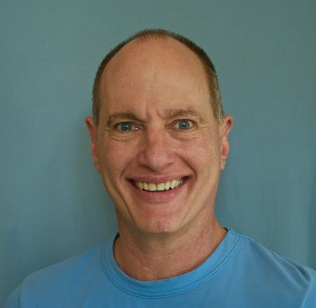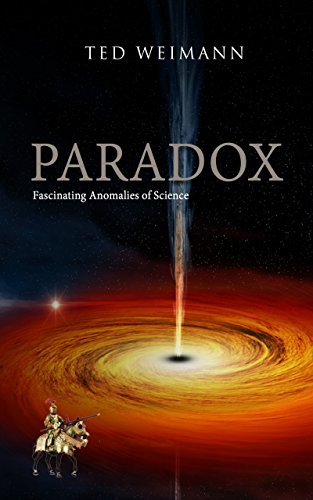 Ted Weimann is obsessed with science and shares what he learns generously in his recent book, Paradox: Fascinating Anomalies of Science from Quest Publications. If you want a crash course on the hottest topics in science today, I highly recommend this book, as you can tell from my recent review. Ted’s enthusiasm and love of learning comes through in his writing, thanks to his ability to synthesize the information and then explain it in a way a person of average intelligence can understand.
Ted Weimann is obsessed with science and shares what he learns generously in his recent book, Paradox: Fascinating Anomalies of Science from Quest Publications. If you want a crash course on the hottest topics in science today, I highly recommend this book, as you can tell from my recent review. Ted’s enthusiasm and love of learning comes through in his writing, thanks to his ability to synthesize the information and then explain it in a way a person of average intelligence can understand.
Ted was gracious enough to grant me an interview, which gives us further insights into his brilliant mind and his ongoing quest for knowledge, fueled by his “Question Everything” attitude.
MF: What motivated you to compile Paradox’s rich collection of modern research?
TW: The thrill of learning about these fascinating topics. I so thoroughly enjoyed the dark energy / center of the universe enigma over the years, that I began noticing other paradoxes. They’re interesting. For instance, who would have thought that France will experience a higher sea level rise than Iceland when the Greenland Ice cap melts? But with the reduced gravitational attraction upon the North Atlantic Ocean because all Greenland’s ice mass is gone, and with the resulting glacial rebound, France actually will.
Something else I didn’t include in that section because I didn’t think about it at the time, is when that part of the North American Plate glacially rebounds, Iceland’s continental rift will likely increase. As you know, Iceland is practically split in half because it straddles two tectonic plates that are moving apart from each other. Its western half will experience some glacial rebounding when Greenland does. Since its eastern half is on the Eurasian plate, that part of Iceland likely won’t, or if it does, will to a far lesser degree. An increase in Iceland earthquakes may be in their future, perhaps even their volcanic activity will increase. We could talk all night about this one topic and all its implications. Scientists could research it for years. I find that pretty cool.
MF: Which part of Paradox is your favorite section?
TW: It’s changed over time. First it was the section on dark energy. And then it was black holes. When I calculated the compression of a neutron star down to a black hole, I made mistakes. Catching those mistakes was fun, and humbling. And then I realized that the neutron star would start rotating faster than the speed of light. Since I knew that this could never happen, I started researching the ways in which this violation of physics was avoided. One of those ways is the decoupling of the magnetic field-lines when they cross the light cylinder. I had never heard of a light cylinder. That was another cool concept I got to research.
Plate tectonics made a run for the number one spot, but I’d have to say the chapters on the evolution and devolution of the human brain are my favorites. So many questions remain unanswered. Like how will our intelligence change in the future?

MF: Tell us about the research/facts presented in your book that surprised you the most.
TW: Probably the agricultural paradox. I knew farmers produced more calories, yet had poorer nutrition than hunter gatherers, but I didn’t realize how much poorer their diets were. I had always been led to believe that hunter gatherers lead such difficult lives compared to farmers. And that’s not necessarily the case.
I also didn’t know that farmers used to live with their livestock. Living in these cramped, filthy conditions is how their diseases evolved and became our diseases. That was interesting.
MF: Do you have a particular source you trust more than others?
TW: The source I use the most, not necessarily for writing books, but for medical research, is pubmed.org. I’ve been researching medical studies on their site since practically day 1. But, as discussed in my chapter on the obesity paradox, the reliability of medical studies is far lower than it should be. So, they’re not my answer to your question.
I’m sorry but, I don’t have any one source to hold up for you. My thanks go to the majority of the experts that take the time to answer questions from me and I’m sure many other people. Sometimes it was research for this book, but often I simply read about their research and had a question about it or its implications. And most of these experts took the time to help me. So, thank you to them.
MF: What do you think the next major technological breakthrough will be (that’s revealed to the public)?
TW: I might have to go with batteries. I’ll be surprised if we don’t have vastly superior batteries 10 or 15 years from now. And that simple advance will have profound changes upon the planet. Think transportation, renewable energy, climate, and the lives of people around the world currently without power. We’ll all benefit with that one, seemingly simple advance.
MF: If you were the one controlling the purse strings to a big chunk of grant money, which branch of science would you reward it to? Why?
TW: Renewable energy. We’re making good progress and I believe we’ll get to where we need to be, but the sooner we get the cost of renewable energy lower than fossil fuels, the better off our climate, and everything tied to it, will be.
Where my passion lies however, is the likely extinction many large mammals will face, regardless of climate change. Because of greed, religion and superstitions, the mega fauna that we all love are in serious danger. I’d like to get Bill Gates, Ted Turner, Jeff Bezos and others together with the purpose of talking them into purchasing a huge track of land in the US and turning it into an African savanna. I believe that’s the only chance elephants, giraffes, rhinos, cheetahs, and others, will have in the long term. It might even turn a profit someday.
MF: What percentage of critical medical knowledge do you think is being withheld from the public?
TW: Nearly 50% of all medical studies go unpublished. To answer your question though, we’d have to define critical. To me, all well conducted studies are critical, because they contain knowledge we need.
MF: Do you have any particular method for recognizing “fake science?”
TW: For me, I’d say it’s a combination of intuition and reason. For example, I just had lunch with a friend who’s an avid hunter. He was showing me photos and telling stories of his wild hog hunting trip, when he said the local experts he was hunting with told him that he should dodge a charging pig to the right, because they can’t turn to the left very well. I told him I didn’t believe that. Rationally, it didn’t make sense to me on an evolutionary basis.
If your gut feelings send you signals, or if the media headline seems a little too dramatic, question it. Do your research.
MF: What do you like to read in your spare time? Strictly nonfiction or do you ever take a break with fiction? If so, which genre?
TW: I was in my 30s when I read my 3rd fiction book, Jurassic Park. The first two were The Little Engine that Could, and Bugs Bunny adventures, or something like that. My 4th was Jurassic Park in Spanish, Parque Jurasico. I started reading The Destroyer, a comedy/ adventure series during my recoveries from my spinal surgeries. I’ve now read about 100 of them. I also enjoy some comedies like The Hitch Hiker’s Guide to the Galaxy, and A Dirty Job. In that book, the author has a hilarious comparison of an alpha male versus a beta male. When I’m healthy though, it’s pretty much non-fiction for me. I like to learn about the world around me.
MF: Do you have any other books planned or in-work at this time?
TW: I did have one I would love to write, but I knew I’d never pull it off. I wrote all the living presidents, requesting interviews with them and their spouses, as well as access to the medical records of the presidents. Of course, none granted me such access. My idea was to conduct a small sample study on the effects of the extreme stress of the presidency on health and aging.
Imagine how much I would have learned in the process. That, would have been fun.
Yes, learning should be fun. I know it is for me, but far too many find it an unpleasant chore. Just think what the world would be like if we could find a panacea for this crippling attitude. Thanks to people like Ted, however, who shares these delicious brain candy tidbits so generously, hopefully others will find the intellectual stimulation as fun and interesting as the next computer game. -MF
You can pick up a copy of Paradox: Fascinating Anomalies of Science from Amazon or the publisher.
